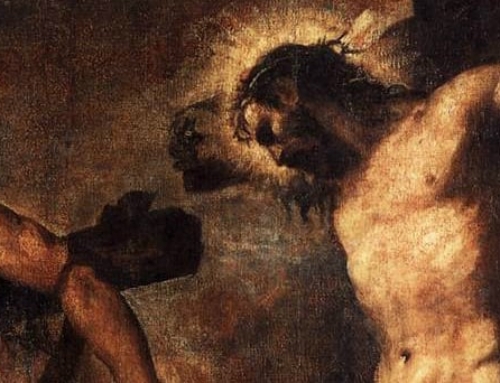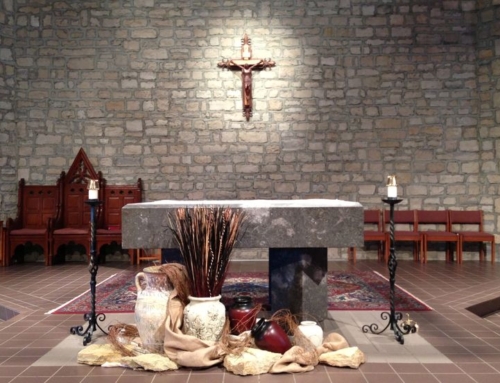It always amazes and delights me to think how practical our Catholic faith is. That is to say, it works. It does what we say it does.
All we need is a bit of persistence and practice for the graces of Catholic devotions to penetrate into our lives and working like yeast through the dough, to change us from the inside out.
Here’s what I mean: There is a problem to be solved, and the problem is sin.
One of the major blind spots in our modern society is that we’ve pushed sin to one side. The modernist priest dismisses sin as “mistakes we sometimes make”. How often have you been to a beige Mass where the Father Fabulous says at the beginning, “Now let’s all take a moment to reflect on some of the things that have happened this week that we wish hadn’t happened.” or “I know all of us have a few things this week that we’re sorry about.”
Everybody’s sitting there trying hard to think of something that happened that they were sorry about and the most they can come up with is that they put pickles on their burger when the expressly ordered it without pickles.
They’ve already been told umpteen times that if their life is a mess its not their fault. That’s the other thing about the modern approach to sin which is ridiculous. Have you noticed how they will blame completely opposite causes for the sin? “Oh that fellow fell into into drugs and crime because he came from an underprivileged background.” Then when little Richie Rich gets caught dealing designer drugs and goes down the tubes they say, “Poor kid. He got into drugs because he came from that overprivileged background.” What about the psychologist who says, “Your problem is that your mother didn’t love you enough.” and the next psychologist says, “The problem is your mother smothered you with too much love.”
Repentance, on the other hand, which is the very first step of being a Christian disciple, is eminently practical. It cuts right through all the nonsense and we say, “It’s me. It’s my fault. I did it, and even if I didn’t do it, I’m taking the responsibility of cleaning it up.”
Sin is the problem and we’re the only ones who can actually do anything about it with God’s help.
There are three levels of sin in our life: the Body, Mind and Spirit levels. The outward sins we commit–the visible stuff–is the sin on the body or physical level. We yell. We lose our temper. We cheat. We steal. We do impure acts. We commit adultery. We curse. We gossip. We drink too much. We do drugs….You know the whole long list. But these sins are only the outward sign of an inward condition. They are the fruit of the deeper levels of sin.
The second level is the Mind level. This is the level of our conscious inner life. These sins go on invisibly in our mind, imagination and emotions. We covet. We envy. We lust. We are greedy. We nurture revenge and resentment. We fear. We hate. Feeding these sins are in many ways worse than the outward sins because they poison our inner life. Through them we feed the wrong desires and feed a darkness within that is rooted in self righteousness and pride. Not good.
The third level is the Spiritual. Now we’re getting down deep to the level of our being which I call sub-linguistic. Others called it the collective unconscious. It is the realm of our dreams, our emotions, our deepest longings–all of which are swirling around in a wordless ocean of emotion. The darkness and pride and resentment and fear at this level is very hard to reach because it is below words and conscious thought.
But stop for a moment and consider how the traditional disciplines of Lent actually, in a very simple and accessible way, deal with these three levels of sin sickness.
Fasting helps to correct the outward sins because it is a discipline of the body. Serious fasting helps us control our appetites and this, in turn, gives us more control over the other areas where our physical desires rage out of control. One of the disciplines to help overcome addictions for example, is a strict regime of regular fasting.
Almsgiving helps to cure the conscious level of Mind-Sin. How does it do this? Because giving our money re-arranges our priorities. We do not give because Father needs to pay the electric bill at church or even because the poor people need soup and a sandwich. We give because by giving we re assess what is most important in our lives. The inner sins of the Mind are most often tied up with our selfishness, our pride and our covetousness. Almsgiving corrects that because by giving alms seriously we put God and others first. That is why we should give alms prayerfully and carefully with this intention in mind–that in giving alms we are setting the right priorities not only with our money, but with our whole mind and whole self.
Finally, prayer is the discipline that penetrates down to that deepest level of our being. What is prayer? Prayer is simply opening our heart to God’s light. The methods of prayer–the Mass, the rosary, the stations of the cross, Eucharistic adoration, request and thanksgiving–all these are means to an end. They are not an end in themselves. The end is that the deepest part of our lives will be opened to the light, love and life of Christ–and through this the sin sick soul will be healed.
What is so terrific about these devotions and disciplines is that anybody can do it. You don’t need to go to Tibet and sit in a snowdrift in your underpants and hum. You don’t need to study Syriac in the libraries of Mt Athos or memorize three hundred Bible verses or master ancient languages to read the Old Testament in Hebrew.
You just go to Mass. Go to confession. Say the rosary. Do the Stations of the Cross, give alms and keep to your Lenten fast.
It’s not really that hard and it is certainly not complicated.
Donor Subscribers go here to follow my dramatized Gargoyle Code podcast for Lent.
Over at my Patheos blog you can follow a 25 part Lenten Bible study of Marks’ gospel. Just go here and bookmark the page then dip in as you see fit.







Leave A Comment
You must be logged in to post a comment.